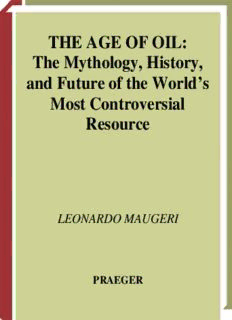
The Age of Oil: The Mythology, History, and Future of the World's Most Controversial Resource PDF
Preview The Age of Oil: The Mythology, History, and Future of the World's Most Controversial Resource
THE AGE OF OIL The Mythology, History, and Future of the World’s Most Controversial Resource LEONARDO MAUGERI Libraryof Congress Cataloging-in-PublicationData Maugeri, Leonardo,1964– Theage ofoil: themythology,history, and futureof theworld’s most controversial resource/Leonardo Maugeri. p. cm. Includesbibliographical referencesand index. ISBN0–275–99008–7(alk. paper) 1. Petroleum—History—19th century. 2. Petroleum—History—20th century. 3. Petroleum—History—21st century. 4. Petroleum industryand trade—History—19thcentury. 5. Petroleum industry andtrade—History—20th century. 6. Petroleum industry andtrade—History—21st century. 7. Petroleum reserves. I. Title. TN870.M339 2006 553.2'82—dc22 2006006632 BritishLibrary Cataloguingin PublicationDataisavailable. Copyright#2006byLeonardo Maugeri Allrightsreserved. No portionof thisbookmaybe reproduced, byanyprocess ortechnique, withoutthe expresswritten consent ofthe publisher. Libraryof Congress CatalogCard Number:2006006632 ISBN: 0–275–99008–7 Firstpublished in2006 PraegerPublishers, 88 PostRoadWest,Westport, CT06881 Animprint of GreenwoodPublishing Group, Inc. www.praeger.com Printedin theUnited States of America Thepaperusedin thisbookcomplieswith the PermanentPaper Standardissued bytheNational InformationStandardsOrganization (Z39.48–1984). 10 9 8 7 6 5 4 3 2 1 To Enzo Viscusi, whomorethananyoneelseaccompaniedmeonmyjourneythrough the oil industry and the complexities of international affairs. His unstinting generosity and wholehearted friendship have made this book possible. List of Abbreviations Contents Note by the Author ix Preface xi List of Abbreviations xix PART ONE A History of an Unreliable Market (and the Bad Policies It Prompted) 1 John D. Rockefeller’s Cursed Legacy 3 2 The Age of Gasoline and Oil Imperialism 19 3 The Carve-up of Arabia’s Oil 33 4 The Oil Glut of the 1930s 41 5 Cold War Fears and the U.S.-Arabian Link 51 6 The Iran Tragedy and the ‘‘Seven Sisters’’ Cartel 63 7 The Golden Age of Oil and Its Limits 77 8 Oil and the Explosion of Arab Nationalism 93 9 The First Oil Shock 103 10 The Second Oil Shock 121 11 The Countershock 133 12 A Storm in the Desert: The First Gulf Crisis 145 viii Contents 13 The Soviet Implosion and the Troubled Caspian El Dorado 155 14 The Collapse of Oil Prices and Industry Megamergers 169 15 The First Oil Crisis of the Twenty-first Century 183 PART TWO Misperceptions and Problems Ahead 16 Are We Running Out of Oil? 201 17 The Inner Secrets of Oil 207 18 The Puzzle of Oil Reserves and Production, and the Quest for Their Control 219 19 The Problems with Oil Quality, Price, and Consumption Trends 233 20 Flawed Forecasts, Foggy Alternatives to Oil 247 21 Arabs, Islam, and the Myth of Oil Security 259 Appendixes 1 Proven Reserves, Production, and Reserves Life Index of the First Twenty Oil Countries in the World and World Totals (2004) 273 2 Consumption Trends of the First Twenty Countries in the World (1980–2004) 274 3 Main Features of Some Qualities of Crude Oil 275 4 The Largest National Oil Companies 277 5 The Largest International Oil Companies 278 Notes 279 Bibliography 311 Index 323 Contents Note by the Author In order to help the reader, I resorted to some simplifications. In dealing with the history of oil companies, I used their current names instead of the original ones they held for part of their existence. So, for instance, the reader will find BP instead of Anglo-Persian Oil Company and—later—Anglo-Iranian Oil Company; Chevron instead of Standard Oil Company of California; Exxon instead of Standard Oil of New Jersey; Mobil instead of Standard Oil New York-Vacuum Oil; Total ratherthanCompagnieFranc¸aiseduPe´trole.Althoughsomemayargue against this choice, I think it will allow the reader to avoid being con- fused by too many names and too many confusing changes that add no value to the tale. Astothetransliterationofforeignnamesandwords(Arabic,Iranian, Russian, etc.) I simply made the choice to use the forms prevailing in current American usage, avoiding those phonetic symbols that—in my opinion—have no sense in the American language. Personally,Idislikeabbreviations.However,Imustadmitthatitisquite boringtoconstantlyrepeat‘‘millionbarrelsperday’’insteadofasimple ‘‘mbd,’’ or ‘‘Organization of Petroleum Exporting Countries’’ in place ofitsOPECacronym.SoIabdicatedtosomeessentialabbreviations.
Description: